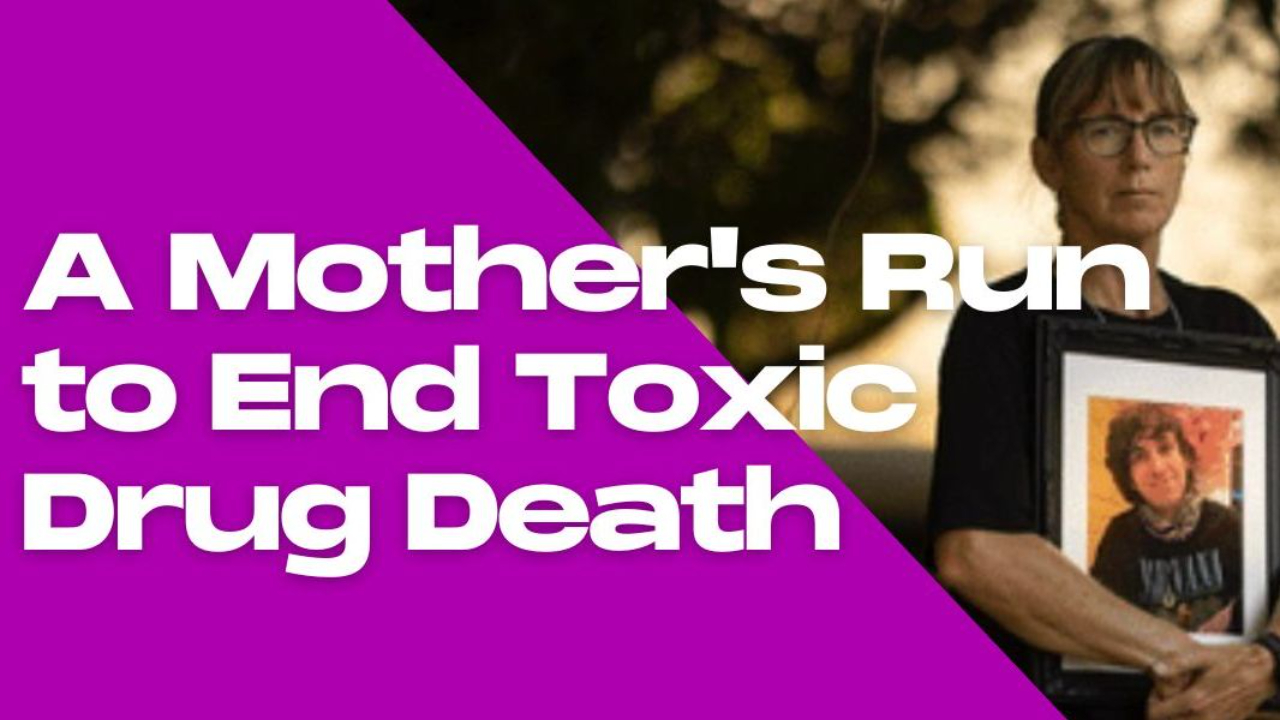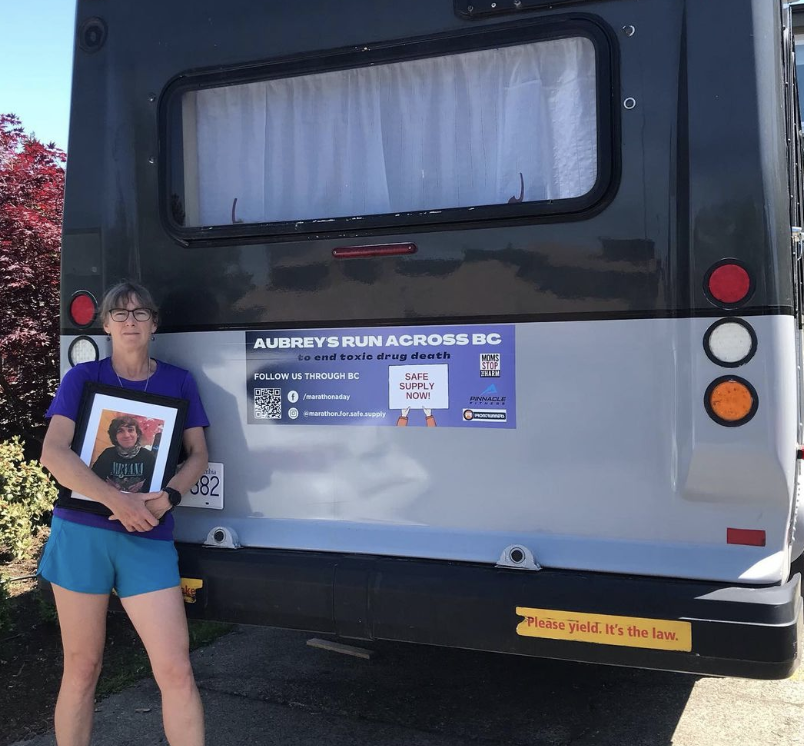
Bad Enough Mothers and the Illicit Drug Poisoning Crisis
May 16, 2023
By Jessica Michalofsky (@marathon.for.safe.supply)
In 2020, just before everything got crazy with the pandemic, I was training for Ironman Penticton. I was also working on an MA in Cultural, Social, and Political studies at the University of Victoria on the topic of mothering and the opioid crisis. My son was 23 years old, in his second year of a diploma in Law and Justice at Selkirk College in the West Kootenays, and in his second year of methadone treatment.
Despite the challenges of distance education, pandemic isolation, and maintaining a methadone program 50km away from a pharmacy, in 2020 my son won two awards in his program—one in Law and Justice Studies and the other in Restorative Justice.
In 2020, I also won an award. I was granted an SSHRC scholarship for research that explores the intersection of popular culture and public health discourses of mothering in the current opioid crisis.
I posed as a research question the following: Does popular perception of drug-related deaths as originating in childhood trauma unfairly position parents, especially mothers, as both the cause and the cure for opioid-related deaths?
Poisoning by illicit drugs was then—as it is now—the leading cause of death for British Columbians ages 10-59 (BC Centre for Disease Control).
I pointed out that Fentanyl had been detected in almost all illicit drugs tested by Health Canada, and that occasional and first-time users were among those who had died. But most importantly, I suggested that despite broadly distributed public-health data connecting the recent rise of opioid-related deaths to fentanyl toxicity, popular discourse continues to suggest that those who die are the cause of their own deaths—such people are constructed as addicted, and increasingly, addiction is portrayed as caused by early trauma.
The whole trauma-directly-causes-addiction notion was just too facile, in my opinion. We know that not all people who undergo trauma develop addictions. What about resiliency? And besides, mothers don’t mother children in a vacuum—they mother in a society that either supports or does not support their efforts.
My research proposal dug into the problems I saw in blaming illicit drug deaths on mothers.
I presented the research of Problematic physician-activist Gabor Maté, who despite good intentions, has exacerbated misperceptions about drug use by attributing drug addiction to “brain circuits” that “develop, or don’t develop, largely under the influence of the nurturing environment in early life.” As evidence for his claim linking addiction and childhood trauma, Maté cites the 1998 publication of the Adverse Childhood Experience (ACE) study, which correlated “abuse or household dysfunction during childhood and multiple risk factors for several of the leading causes of death in adults.”
I pointed out that a 2019 critique of the ACE framework called it “an insufficient and ill-adapted tool … likely to stigmatize families and children.” Furthermore, showing how ideas created by the medical world had made it into popular culture, I cited a 2018 survey, in which non-professionals rated the most likely cause of addiction to heroin as “traumatic events early in childhood… and the way a person was raised.” In fact, subsequent studies have found that social representations of the bad parent are “ubiquitous in cultural products and discourses related to parenthood, especially to motherhood” (Courcy & des Rivières).
My actual thesis veered away from public health discourse and focused on the problems of autobiography as they relate to power and privacy, and mothering. Writing about my adult son, specific to his drug use, presented ethical problems for me. I felt guilty about writing about my son, and yet I needed to express the complex experience of mothering during the opioid crisis, and I felt angry that popular culture saw me as the source of my son’s problems.
I ended up writing a ridiculously complex meta-memoir that placed characters very much like my son and I in a Virginia Woolf novel. I can’t believe they allowed me to graduate. Flummoxed with what to do with an unpublishable thesis, I did what any disgraced quasi-academic would do: I applied to a Ph.D. program.
I spent a month beavering away on a proposal that explored the concept of the Bad Enough Mother. Most people will have heard of attachment theory, and perhaps even D. W. Winnicot’s concept of the Good Enough Mother, which champions the ordinary and “sound instincts of normal parents” against the encroachment of professionalism into parenting. Few, however, will have contemplated the figure of the Bad Enough Mother.

The Bad Enough Mother is not my creation. I owe a debt to Julie Leavitt of the Psychoanalytic Institute of Northern California and a short piece of hers I found that changed my thinking about my experience of mothering during the opioid crisis.
Leavitt’s thesis is that “a mother’s interpellation of gender is an echoed call to resistance against society’s interpellation of mother.” In plain English, Mothers have been too-good, and this too-good behavior and identity serve to reinscribe classist, ableist, racist, and patriarchal values.
In fact, not only does “bad mothering” not harm children, but it actually protects them from the essentializing forces of patriarchy and colonialism and teaches them the language of talking back. In other words, ordinary “Good Enough Mothering” is inadequate to resist patriarchal control. It should go without saying that I differentiate “bad mothering” from acts of abuse, neglect, or harm to children. Harm to children is child abuse, not bad mothering.
Bad mothering can be construed as follows: mothering while being disabled, while being poor, while using substances, while being in recovery; mothering while being brown or black or Indigenous; mothering while working or going to school; mothering while being focused on a passion or sport; mothering while having a romantic or sexual relationship, while working in the sex trade; mothering while being queer, unmarried, young or elderly.
My being a good mother could not have prevented my son’s death by fentanyl poisoning in August of 2022. He didn’t die because I spent too much time working or was distracted by vainglorious ideas of academia; or because I am in recovery from alcoholism, or that I spend too much money and time on being an amateur athlete. He didn’t die because I owed $60,000 in student loans or that I was a single mother. My son didn’t even die because he was an “addict”—whatever that is. He died because he sometimes used drugs, and he could not evaluate the content and potency of the drug he was taking.
I suggest that focusing too narrowly on the causes of “drug addiction” loses sight of the person who is using drugs, ignores the toxicity of the drug supply, and harms mothers. Instead, I wish we would put our efforts toward stopping people from dying.
In May and June, Jessica is running across British Columbia in memory of her late son, Aubrey. Follow her on Instagram at, @marathon.for.safe.supply
Works Cited and Suggested Reading
British Columbia Coroner’s Service. “Illicit Drug Toxicity Deaths in BC January 1, 2009 – August 31, 2019” https://www2.gov.bc.ca/assets/gov/birth-adoption-death-marriage-and-divorce/deaths/coroners-service/statistical/illicit-drug.pdf
Courcy, Isabelle and Catherine des Rivières (2017) “From Cause to Cure”: A Qualitative Study on Contemporary Forms of Mother Blaming Experienced by Mothers of Young Children with Autism Spectrum Disorder,” Journal of Family Social Work, 20:3, 233-250, DOI: 10.1080/10522158.2017.1292184.
Devaney, Eva. "The Emergence of the Affected Adult Family Member in Drug Policy Discourse: A Foucauldian Perspective." Drugs: Education, Prevention and Policy, 24:4, 2017, pp. 359-367
Eyerman, Ron, and SpringerLink (Online service). Memory, Trauma, and Identity. Springer International Publishing, Cham, 2019, doi:10.1007/978-3-030-13507-2.
Canadian Association of People Who Use Drugs, 2019, http://capud.ca/
Felitti, Vincent J. et al. “Relationship of Childhood Abuse and Household Dysfunction to Many of the Leading Causes of Death in Adults: The Adverse Childhood Experiences (ACE) Study” May 1998, 14:4, pp. 245–258. American Journal of Preventative Medicine. https://www.ajpmonline.org/article/S0749-3797(98)00017-8/fulltext
Fentiman, Linda C. “Blaming Mothers: American Law and the Risks to Children's Health,” Beaverton 2017:13, Beaverton: Ringgold Inc., NYU Press.
Foucault, Michel. The Archaeology of Knowledge. Translated A. M. Sheridan Smith. Tavistock Publications, 1972.
Irving, Michelle and Cyrille Delpierre. “A Critique of the Adverse Childhood Experiences Framework in Epidemiology and Public Health: Uses and Misuses” Social Policy and Society. 3 Apr. 2019. DOI: 10.1017/S1474746419000101.
Lang, Brent and Harold Rosenberg. “Nonprofessionals’ Perceptions of the Causes of Behavioral and Substance Addictions,” Journal of Addictive Diseases, 37:1, 2018, pp.102-108, 23 Feb 2019 https://doi-org.ezproxy.library.uvic.ca/10.1080/10550887.2019.1574187.
Lazar, Michelle M. Feminist Critical Discourse Analysis: Gender, Power, and Ideology in Discourse. Palgrave Macmillan, 2005.
Leavitt, Julie. “The Bad Enough Mother.” Studies in Gender and Sexuality, 21, pp. 58-61, Jan. 2020, DOI:10.1080/15240657.2020.1721141
Maté, Gabor. In the Realm of Hungry Ghosts: Close Encounters with Addiction, Vintage Canada, 2018.
Ministry of Mental Health and Addictions, British Columbia. 2019, https://www.stopoverdose.gov.bc.ca/
Ministry of Mental Health and Addictions, British Columbia. 2019, “Responding to British Columbia’s Public Health Emergency Progress Update March – July 2019.” https://www2.gov.bc.ca/assets/gov/health/about-bc-s-health-care-system/office-of-the-provincial-health-officer/overdose-response-progress-update-march-july-2019.pdf
Winnicot, D.W. The Child, the Family, and the Outside World, Penguin Books, 1973.
Make your inbox Feisty
Get the latest in women's sports & performance news every week with The Feist. Read a sample newsletter here.
We hate SPAM. We will never sell your information, for any reason.

